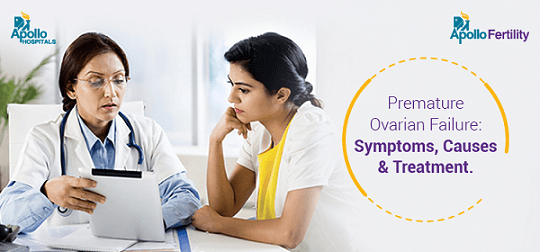What is Premature Ovarian Faliure
Premature ovarian failure which is now known as premature ovarian insufficiency, is a condition in which a woman’s ovaries produces less eggs than they are generally supposed to produce.
Does it affect pregnancy?
Well, yes and no.
Ovaries have two million follicles. Every month when one of these follicles matures and goes unfertilized, it bursts; hence your monthly cycle. It’s a natural process that starts at a very young age and after 45 heads gradually toward menopause, stopping of the menstrual cycle entirely.
Premature ovarian insufficiency meddles with the production of these follicles. As a result, it causes a significant decline in the egg generation.
Displaying early menopause like traits, premature ovarian insufficiency still allows a woman to menstruate, but the cycle is sporadic; sometimes skipping even months before your next period. Doesn’t mean women can’t get pregnant. They still can, but the chances are much lower than the women who have fully functioning ovaries.
What causes premature ovarian insufficiency?
Doctors haven’t been able to pinpoint the exact origin of this condition. Experts, though, adds that premature ovarian insufficiency could be hereditary.
Doctors connects the dot of premature ovarian insufficiency with few of the following things:
- If your sister or mother has it, 90% chances are you’ll have it too.
- When either of the ovaries fail, it causes premature ovarian insufficiency which further leads to difficultly in conception.
- Having autoimmune disease such as lupus, rheumatoid arthritis, or type I diabetes can greatly compromise your ovaries.
- Genetic disorders such as Turner Mosaicism where an entire X chromosome is missing, or is too fragile that it eventually breaks, causes premature ovarian failure.
Few doctors also hypothesized a theory where polluted and the toxins present in the atmosphere— which are known for causing a myriad of skin and unspeakable diseases— also have a detrimental impact on ovaries which results in them failing prematurely. But, no one has been able to attest whether this theory is accurate or not, yet.
Symptoms:
One of the distinguishable symptoms is premature menopause.
- Lower levels of estrogen causes irregular periods also known as amenorrhea.
- Going through anxiety, depression, or mood swings.
- Reduced sex drive.
- Fatigue, hot flashes, and sweating during the night.
The most common symptoms are infertility, vaginal dryness, sexual dysfunctioning, and insomnia.
Treatment:
Treatment for ovarian insufficiency depends on the severity of the disorder. Nevertheless, the disorder is treatable and can be treated with suitable medications.
Restoration of estrogen:
Lower levels of estrogen cause osteoporosis. Having a hormonal restoration therapy can save a woman from bone loss. This therapy also helps bridge the deficiency if only slightly. Even a minor increase can change the probability of conception notably.
However, taking estrogen alone can cause precancerous changes in the lining of the uterus. Which is why, doctors always suggest progesterone with estrogen to keep it intact.
IVF Treatment:
If premature ovarian failure is causing a hindrance in you becoming a parent, you can always resort to advanced treatments. IVF treatment is a famous treatment that guarantees positive outcomes.
There are many reasons that contribute to the delay of a woman’s period. Make sure if it’s either one of it before panicking. Of course, getting examined by experienced doctors could make the entire process easy on you.
Even if you are struggling with premature ovarian insufficiency, considering IVF treatment is not a bad idea. There are many successful stories tied up to the treatment itself.
